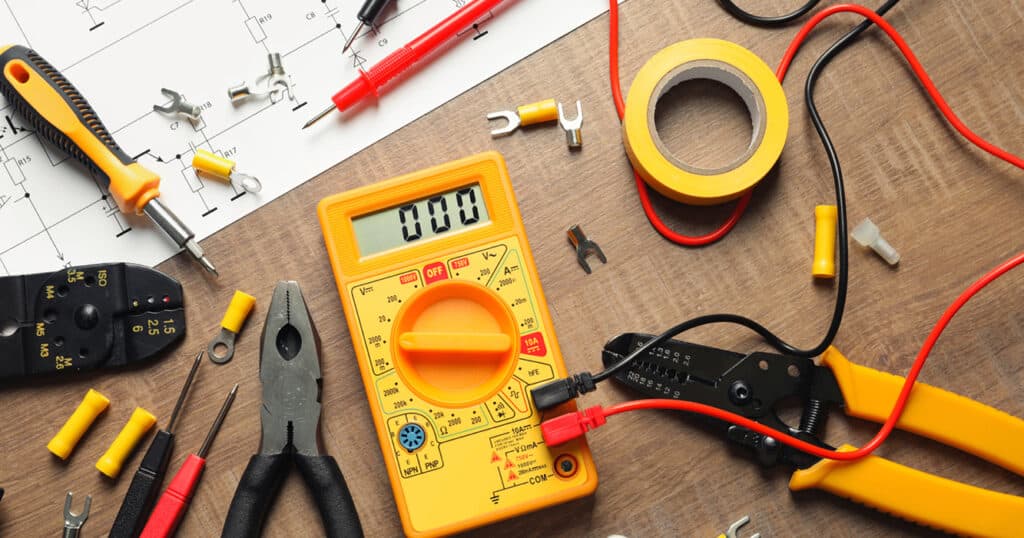How to Start an Electrical Business in 2022
Starting your own electrical business can be exciting, but it’s also a big decision. In this comprehensive guide, we’ll explain everything you need to know about starting an electrical business.

Staff Contributor
First, the big question. Is starting an electrical business a good idea? Yes, it is.
And here’s why.
You can’t overstate the importance of electricity in the modern world. Electricity is the lifeblood of today’s digital civilization. For perspective, the U.S. consumed 3,930 terawatt hours of electricity in 2021. And that figure will only rise in the coming years.
Who facilitates this enormous energy consumption? The electricians who install, service, and repair electrical systems.
Electrical services will always be in demand.
Speaking of demand for electricians, data from the BLS puts it into sharper perspective. Employment for electricians will grow 9% by 2030, creating almost 85,000 new jobs. Additionally, the $108.5 billion electrical services market will see a 7% CAGR (compound annual growth rate) over the next five years.
That’s likely more than enough to tap into your entrepreneurial spirit.
In this article, we’ll explain everything you need to know about starting an electrical business. This is a comprehensive guide. We’ll cover all 10 of these steps:
- Starting with the right mindset
- Researching the local industry and your target market
- Drafting a solid electrical business plan
- Figuring out finances
- Registering your business
- Getting permits and licenses
- Setting the business up
- Getting insured
- Spreading the word
- Grow your business
Let’s talk about turning your skills into a profitable thriving business, one step at a time.
1. Start Your Electrical Business with the Right Mindset
This is a crucial first step that many new entrepreneurs skip. Starting your own electrical business can be exciting, but it’s also a big decision.
Remember, you’ll be dealing with more than wires and appliances. You’ll also be responsible for your customers’ quality of life, property, and safety. On top of that, starting and running a business calls for undying commitment, thick skin, and a big heart.
Do you have what it takes to start an electrical business? Find out by asking yourself these questions:
- Why do I want to start my own electrical business?
- How far do I want it to go?
- What will success look like?
- Am I prepared to face the risks and challenges ahead?
Go in with a positive attitude.
Instead of wondering, “what if I fail,” focus on how to make it work. Starting a business with the wrong motivation or mindset will cloud your path and set you up for failure.
2. Research the Local Industry and Target Market
The next step is to determine the logic of starting an electrical business in a particular area.
To do this, survey your market and competitors. Get the lay of the land, so to speak. This is called market research and competitive analysis.
But it’s not as complicated as it sounds.
You need to answer the following questions to get a good feel of the market:
- Target market: Who do you see as your potential customer? Homeowners, building managers, construction companies, or a specific class of businesses?
- Demand: Is there demand for electrical services in your target market? If so, could you meet that demand?
- Market saturation: How many electrical businesses already operate in the area and sell what you would sell?
- Pricing: How much are customers paying for these services, and how do they feel about it?
Collect as much information as possible about your target market. Use surveys, online marketing tools (like Google Trends), and the yellow pages. You should study would-be competitors, and interview target customers.
See the top states with the highest-paid electricians. Get familiar with the top electrical tools for apprentice electricians.
Asking the right questions will give you a good overview of the market.

3. Draft a Solid Electrical Business Plan
Think of a business plan as the master blueprint of the venture. A well-written business plan defines your business. That includes goals, operations, logistics, services offered, and growth projections.
It’s a roadmap to starting and running a successful business. It also comes in handy when convincing partners, investors, or funders to come on board.
Don’t worry about the format or structure; focus on getting the message across. That said, here’s a guide to help you write a proper business plan. Generally, an electrical business plan should include the following items:
Business Overview
Start with a detailed description of the business.
What kind of electrical services will you offer? Domestic/commercial wiring, equipment installation, service and maintenance, or all the above?
Also, describe exactly how the business will work. For example, will you do the electrical work yourself, subcontract it, or hire employees?
Value Proposition
What makes your business special, competitive, or appealing to customers? This is your unique selling point (USP), the tangible value your business brings to the market.
It could be anything. That includes attractive prices, high-quality electrical work, or even specialized services.
Customer Segments and Engagements
Describe your ideal customer and your plan to reach out to them. This is where you define your marketing strategy.
What kind of relationship do you hope to build with your clients?
Customer engagement is a big part of a business model. Especially if you’re counting on customer loyalty to help maintain the business.
Cost Structure
Pricing electrical services can be complex.
- You could charge an hourly rate for services
- You could price individual jobs on a contract basis
- You could even develop a subscription plan for long-term customers
Of course, the cost structure and final price tag will depend on many factors. Consider market benchmarks, the service’s value, profit margins, and job complexity.
Revenue Streams and Sales Projections
So we’ve nailed down pricing, logistics, and customer engagement. Now you can start to get a clear picture of how the business will make money.
That includes projected profits over time.
Although it’s good to be optimistic when starting a business, these projections should be realistic. After all, you’ll plan your business growth based on these estimates.
Calculate well-informed projections based on the most plausible worst and best outcomes.
Partnerships and Affiliations
Will you team up with electrical manufacturers, suppliers, or even other contractors?
It’s common for electrical service providers to partner with well-known brand names. It gives smaller business (like brand new businesses) an edge in the market.
Reserve a section in your business plan to describe any such partnerships.
Growth and Success Metrics
Come up with a definition for growth and set clear markers of success. Doing so will help you plot the direction of your business.
For an electrical business, showing proof of customers, workers, assets, jobs, and partnerships are indisputable growth indicators.
4. Figure Out the Finances
Financial planning is part of the whole business plan. Poor cash flow management is repeatedly quoted as one of the main reasons startups fail.
Cash flow management involves tracking and planning the monies going in and out of a business. You really don’t want to mess this up when starting a new business.
Here are three essential tips to remember:
1. Understand Your Startup and Running Costs
Calculate how much it will cost to start and run the business. Be very specific.
First, list all the necessary capital investments. Then add up all recurring expenses for at least the first six months in business.
These may include:
- Vehicles and machinery
- Specialized electrical tools and equipment
- Insurance and licensing fees
- Training fees
- Marketing and branding costs
- Salaries and wages
- Rentals
Do you have enough cash to cover all of that?
If not, you need a reliable way to finance the business. Consider soft loans, contributions from friends/family, liquidating some of your assets, or taking a business loan, if you’re eligible for one.
2. Keep Your Overhead Low
Minimize your spending and cash outflow as much as possible. Don’t put money into unnecessary expenditures and find practical ways to cut back.
For instance, instead of buying a new work van, you could repurpose your own vehicle. Instead of hiring full-time employees, consider contracting with workers on a per-job basis.
3. Separate Your Personal and Business Finances
It’s a rookie mistake to mix personal and business finances. Mixing them makes bookkeeping a nightmare. It also clouds visibility into business performance.
After registering your electrical business (we’ll get to that), apply for a business bank account and credit card to manage the enterprise’s income and spending.
5. Register the Business
Every business operating in the U.S. must be registered unless it’s under the owner’s legal name.
Registering an electrical business is straightforward. Decide on a name, pick a suitable business structure, and file a registration application with the Secretary of State’s office.
Naming the Business
Come up with a unique and catchy name to represent your business. You want something that’s easy to spell, pronounce, and memorize. It should be a name that customers can quickly associate with what your business does.
Don’t get too creative here or you’ll only confuse potential customers.
While brainstorming names, use that same energy to come up with a catchy URL for your website. A good URL should contain the business’s name, or some version of the name.
You want customers to quickly identify the business from its web address.
Registering an LLC
You can set up a small electrical business as a sole proprietorship, a partnership (if there are partners involved), or a limited liability company (LLC).
A sole proprietorship is the simplest business structure. But it doesn’t separate personal and business assets, which can be a problem.
The best option is to register your business as an LLC. This will create a legal divide between you and the business. Plus, it can still be a single-person enterprise.
The LLC registration process and requirements vary from state to state. Generally, you need to nominate a registered agent and submit various documents, such as an LLC Operating Agreement and Articles of Organization.
It can take up to 14 days (or even longer) for the Secretary of State to approve an LLC application. But some states can fast-track the process at an extra fee. In some cases, it only takes a few days or hours.
Next, register with the IRS and get your Employer Identification Number (EIN). Your EIN is like your business’s social security number. You can apply for an EIN online, by mail, phone call, or even by fax.
6. Get Permits and Licenses
You’ll need a permit to work as a professional electrician or contractor. These are issued by states or municipalities.
In most states, electrician licensure is tiered depending on skill level and experience.
Check with your local licensing authorities on what’s needed to run an electrical business. They’ll want to see various qualifications and some years of experience in the field.
Plus, there will be a licensing fee and there may be an arbitrary qualifying exam.
If you’re planning to hire contractors, be sure to check their licenses and qualifications too. Keep in mind that employers, by law, are responsible for the wrongful acts of their employees, provided those acts occur within the employment scope.
Be sure you hire competent workers who won’t jeopardize your business. Review the top electrician recruitment agencies to help you build a strong team.
Some states and cities may also require electrical companies and contractors to have certifications or permits to work certain jobs or operate in certain areas. Check with the local licensing bodies (both government and industrial) for any mandatory electrical business or contracting permits.
7. Set Up
With the registration and licensing paperwork out of the way, you can start putting the business together and preparing it for the public.
What you do at this stage depends on the scope of your business. Here are some of the items for your to-do list:
- Get business/industrial training or coaching
- Buy work equipment, tools, gear, and inventory as needed
- Hire qualified electricians and other professionals (if necessary)
- Set up a business phone system
- Organize business facilities (vehicle parking, tools/equipment storage, contact office, etc.)
8. Get Insured
The last bit of major paperwork is getting insured.
Why do you need insurance for an electrical business? Because dealing with electricity is dangerous work. Even with skills and experience, things can go wrong.
For instance, your employees could get hurt. Or there could be damage on the job site. Your business assets (vehicles, machinery, premises, tools, equipment, etc.) could also need coverage.
Insurance protects your business from damage and injury-related liabilities—mainly monetary costs and lawsuits. It also helps solidify customer trust.
Most property owners would never risk their expensive electrical systems on uninsured electrical contractors.
You’ll probably need at least four essential types of insurance coverage:
- Commercial general liability insurance: This covers personal injury, bodily harm, and property damage claims against the business.
- Professional liability insurance: This protects your electrical business against claims of errors, negligence, or malpractice from clients.
- Workers’ comp: Texas and Oklahoma are the only states that do not require private employers to purchase workers’ comp. The policy covers medical bills, rehabilitation, and lost wages for employees injured at work.
- Property insurance: This is a general term for insurance policies that cover your business assets against damage or loss. You’ll probably have to purchase separate policies for the various assets such as vehicles, business premises, and electrical equipment.
Many entrepreneurs opt for what’s known as a business owner’s policy (BOP). It’s a bundled insurance package containing general liability and property covers.
A BOP is simpler and less expensive than multiple independent policies and is ideal for electrical businesses. But make sure you understand what liabilities the policy covers before signing it.

9. Spread the Word
By this point, the business should be up and ready to go. It’s now time to find customers. That brings us to the next step—marketing.
This is a big one. Your marketing strategy could make or break the business. But it will be much easier if you nailed your market research and business planning early on.
Marketing an electrical business is about presenting it to the right people. Profile your potential customers. Determine where to find them and how to convince them to buy your electrical services.
Focus your marketing efforts on these critical areas:
Branding
Branding is what distinguishes your electrical business from others like it.
The branding style also determines how the business presents itself to customers. Ensure that every branding element, from the logo and color scheme to the slogan and mission statement, says exactly who you are and what you do.
Local Search Engine Marketing
Most consumers use the internet to look up nearby businesses when shopping for local goods and services. In a November 2021 survey, only 1% of the respondents said they didn’t search for a local business online.
Leverage this powerful tool.
Create an electrical business website and optimizing it for local search. Getting your business listed on online directories, such as Google Business, also helps.
Social Marketing
Social media is another effective way to advertise an electrical services business.
You can use dozens of free and paid advertising features on Facebook, Instagram, Twitter, Nextdoor, and LinkedIn to generate and convert targeted leads.
The Local Scene
Don’t forget to advertise physically in your service area.
Try billboards, cold pitching, handing out flyers, and so on. These old-fashioned tactics may not seem as elegant as digital marketing, but they still work.
10. Grow Your Business
Many startups do not fare well after launch.
According to the Bureau of Labor Statistics, about 20% of startups fail in their first year. As an aspiring entrepreneur, you can learn a lot from this comprehensive report.
But don’t let it scare you. Rather, think of it as a guide. It can prime your business for success right from the start.
And that’s not all. Here’s a list of valuable tips to keep in mind as you build your electrical services business:
- Prioritize customer satisfaction
- Stay in tune with the best and latest electrical technologies
- Keep a close eye on your competition
- Focus on sustainable growth rather than explosive growth
- Borrow money only when you absolutely need to
- Be agile and flexible to swing with the market dynamics
- Keep supportive and progressive company
A Good Idea for Qualified Electricians
That’s how to start your own electrical business.
It might seem daunting, but so does everything else at first glance. The key is to not overwhelm yourself or lose focus. Take it one step at a time. And don’t forget to ask for help when you get stuck.
You’ll quickly learn the ropes and gain momentum once you start. More importantly, keep your motivation alive. Stick to your goals throughout the startup journey.
Here are a few practical things you can do to get started right now, today:
- Start by deciding why. Work your way through those critical questions in step 1. Why do you want to start you own electrical business? What do you hope to accomplish? What does success look like? Take the time to write out your answers. These can help you maintain focus and momentum when things are challenging.
- Scope out your services. What kinds of jobs do you like best? Is there a specific type of work you want to do? Or a specific type of customer you want to work with? Write all of that out, too. This will give you a leg up when it comes time to start marketing efforts.
- Brainstorm a name. Talk to your partner, your friends, and your family. Tell them what you’re planning and ask for their help coming up with a name. A business name is like an anchor. Once your business has a name, it feels real.
- Access minimal profitability. In other words, how much will you need to make to support yourself? How much will you need to make to be able to hire one employee? Two? Knowing those numbers will give you some soft targets when it’s time to develop your business plan.
Simone is passionately committed to clear copy—no matter who the reader is or what’s being communicated. When she isn’t arguing over semantics, you can find her running, managing too many pets, or wearing passive aggressive t-shirts on video calls.

Business Solutions For Field Service Pros
EverPro offers specialized solutions designed for home and field service professionals. We’ve got the business tools to help you get the job done.



